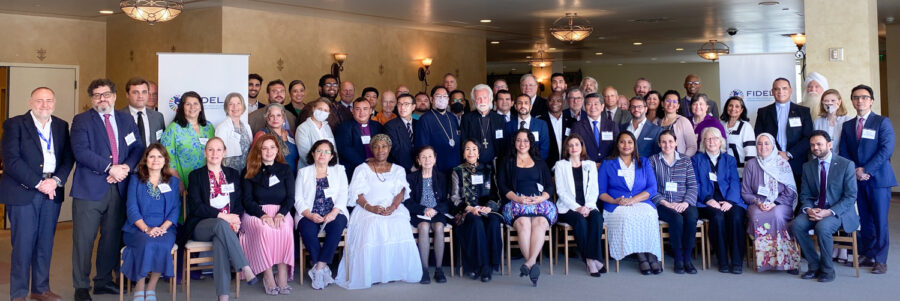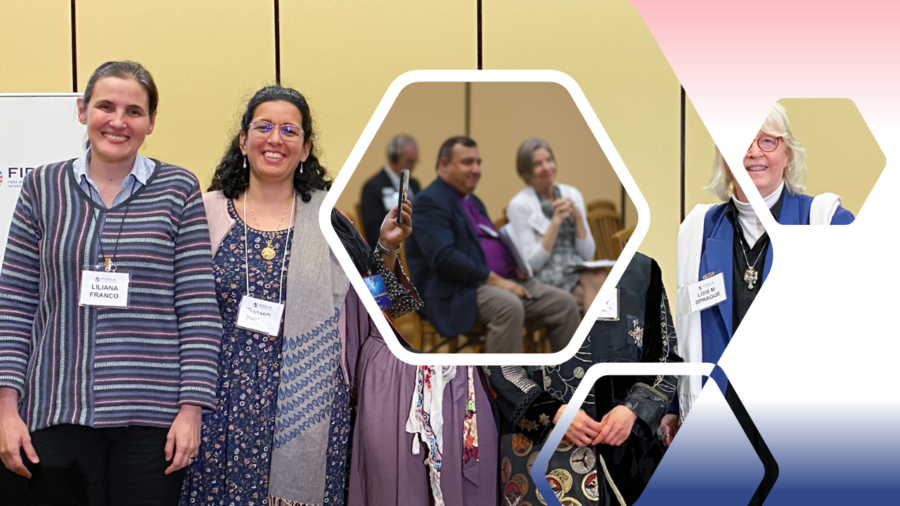FIDELA – Where the Americas Met
September 6, 2022FIDELA – Where the Americas Met The Interreligious Summit of the Americas – FIDELA, held in Los Angeles, California, from 6-8 June 2022, was attended in person by over 100 religious leaders and representatives from faith-based organizations, as well as policy experts from throughout North, Central, and South America and the Caribbean. This gathering was also made available to a larger online audience. Participants included a diverse group of Indigenous, Afro-Latino Americans and Caribbeans, Hindus, Buddhists, Sikhs, Catholics, Anglicans, Jewish, Muslims, Bahá’is, Lutherans, Methodists, Reformed Christians, Baptists, Evangelicals, Adventists, Orthodox Christians, Latter-day Saints, and others, including youth voices, whom all came together to share their distinctive insights, values, and concerns regarding the needs of the Western Hemisphere – all within the framework of interreligious cooperation and collaboration that inspires to work together for peace, justice, solidarity, and co-existence.
The Interreligious Summit of the Americas – FIDELA, held in Los Angeles, California, from 6-8 June 2022, was attended in person by over 100 religious leaders and representatives from faith-based organizations, as well as policy experts from throughout North, Central, and South America and the Caribbean. This gathering was also made available to a larger online audience. Participants included a diverse group of Indigenous, Afro-Latino Americans and Caribbeans, Hindus, Buddhists, Sikhs, Catholics, Anglicans, Jewish, Muslims, Bahá’is, Lutherans, Methodists, Reformed Christians, Baptists, Evangelicals, Adventists, Orthodox Christians, Latter-day Saints, and others, including youth voices, whom all came together to share their distinctive insights, values, and concerns regarding the needs of the Western Hemisphere – all within the framework of interreligious cooperation and collaboration that inspires to work together for peace, justice, solidarity, and co-existence.
Addressing sustainability, resilience, and equity, FIDELA participants identified the following priority concerns of religious voices regarding the human impact of inequalities in the hemisphere, shortfalls in the protection of human rights and dignity, and the need for purposeful action that will truly offer hope and opportunity to those most vulnerable:
- The COVID-19 pandemic has demonstrated the need for urgent health system reforms, including addressing ongoing immunization issues, transnational preparation for future pandemic events, improvements to assure equitable access and quality, and the need to assure that mental health services are an expanded and integral part of health systems.
- Policies aimed at eliminating all invidious discrimination based on race, religion, gender, indigenous heritage, and sexual orientation should be supported, taking care to ensure that fairness for all is achieved.
- The continuing and expanding crises associated with refugees and displaced persons need to be addressed effectively, paying attention to the root causes of the problem, the urgent needs of those affected, and finding long-term solutions.
- Integral solutions to environmental challenges, including climate change and Amazon deforestation, and taking into account concerns of all stakeholders, including loss and damage, need to be identified and implemented.
- Priority action must be taken to redress the lost educational opportunities for children, especially those without full Internet access.
- Governments should engage the teachings, skills, and networks of religious and interfaith communities in promoting democratization and addressing violence and corruption challenges.
- Continued vigilance in protecting freedom of religion or belief and freedom of expression is vital because of the fundamental importance of these rights in promoting citizen participation and undergirding the contributions that religious and belief communities and others make to democratic life in the Western Hemisphere.
 Rev. Dr. Masahiro Nemoto, Deputy Secretary General of Religions for Peace, reminded us that the goal of the event, which aligns with the goals of Religions for Peace, is to provide a multireligious and multisectoral platform for religious leaders, civil society actors, and policymakers to come together to discuss and seek answers to the most urgent issues of the hemisphere – specifically offering their unique perspective to the government leaders gathering at the Summit of the Americas.
Rev. Dr. Masahiro Nemoto, Deputy Secretary General of Religions for Peace, reminded us that the goal of the event, which aligns with the goals of Religions for Peace, is to provide a multireligious and multisectoral platform for religious leaders, civil society actors, and policymakers to come together to discuss and seek answers to the most urgent issues of the hemisphere – specifically offering their unique perspective to the government leaders gathering at the Summit of the Americas.
“In order to solve the most urgent problems, we must abandon ‘only this’ or ‘only that’ behavior,” he stated. “We need to transform our minds from the attitude of ‘only religious people, only my religion, only my country, only my region.’ We cannot afford to act alone. We cannot solve these problems unless we act together.”
Women’s participation and the addressing of the many issues women face in the Americas today are of particular importance at FIDELA. Of the many topics addressed, the most pertinent were:
- Importance of youth, particularly young women of all faiths and indigenous traditions, welcomed to the table of discussion
- Responsibility of religious institutions and leaders to guarantee that faith communities have equal participation
- The need to live with and in equity and hear the needs of the community
- Overcoming the troubling, deep polarization that we see globally, linked to inequality and injustice
- Addressing gender-based violence
- Building peace and finding avenues to coexistence
- Caring for the most vulnerable and translating that into concrete action, especially in protecting and helping women and children
- Battling corruption
- The Effects of Migration on women and children, especially human trafficking
Other important topics addressed that we must continue drawing attention to are how the planet is dying because of our lack of environmental care and that our economy and religion can be understood and centered around how we care for the planet. It was suggested that we need to create a new paradigm that refocuses humans around caring for all of humanity and for the nature that surrounds us. Also discussed was the increase in secularization within the private sector and how this has been used in nations that had a large number of believers to erode religious belief. This has caused a decline in self-professed religious beliefs, especially among youth, along with a lack of knowledge about practitioners and their beliefs. This disconnect has further led to a series of conflicts between state and religion that previously had not been an issue.
In closing, Ambassador Rashad Hussain from the Office of International Religious Freedom centered his remarks on the critical role that religions have played in advancing goodness around the world. “The reality is that any time a person anywhere in the world is motivated by something positive they learned in their religious upbringing, that’s the impact of religion on our society. These people may not be what we consider to be ‘religious people.’ But the fact that they’ve been inspired and shaped by religion is something we need to acknowledge … I would hate to imagine a world where religions weren’t inspiring so many people to do good and preventing so much harm. But we can do so much more.”
FIDELA participants plan to find ways to address attention to these priority issues and other important issues identified during the Second Interreligious Forum of the Americas and will seek continuing opportunities for follow-up in the ongoing Summit of the Americas process
(Partially prepared using the official FIDELA Report found here – https://www.rfp.org/wp-content/uploads/2022/06/FIDELA-Statement.pdf ; as well as here – https://blog.g20interfaith.org/2022/06/18/opening-plenary-the-second-interreligious-forum-of-the-americas-fidela/)